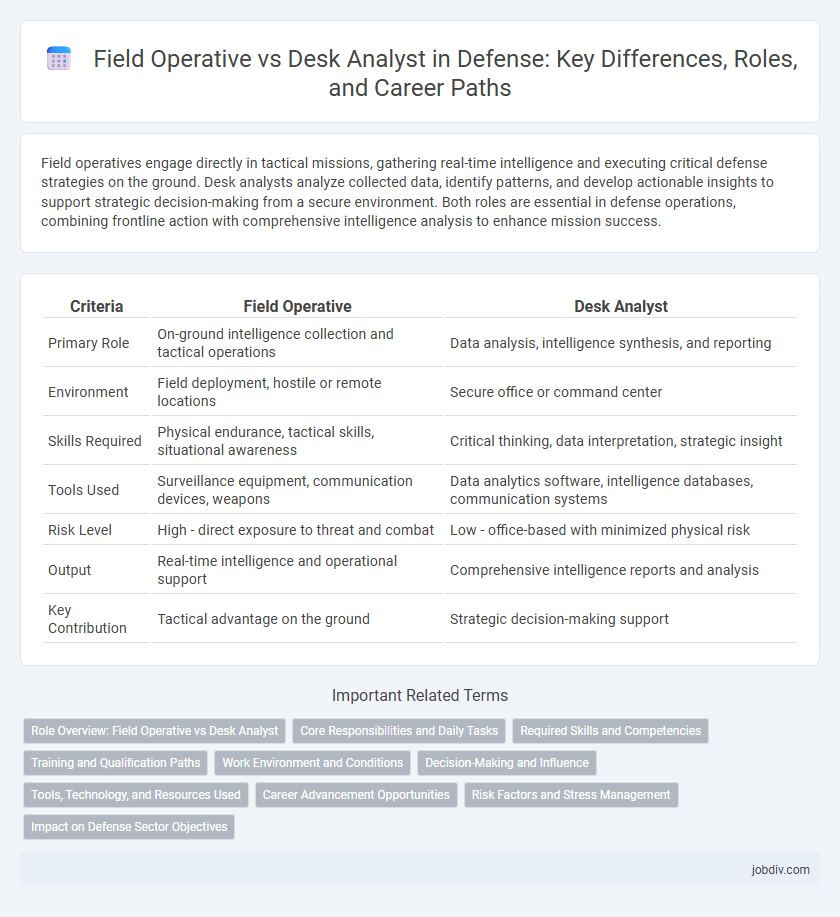Field operatives engage directly in tactical missions, gathering real-time intelligence and executing critical defense strategies on the ground. Desk analysts analyze collected data, identify patterns, and develop actionable insights to support strategic decision-making from a secure environment. Both roles are essential in defense operations, combining frontline action with comprehensive intelligence analysis to enhance mission success.
Table of Comparison
| Criteria | Field Operative | Desk Analyst |
|---|---|---|
| Primary Role | On-ground intelligence collection and tactical operations | Data analysis, intelligence synthesis, and reporting |
| Environment | Field deployment, hostile or remote locations | Secure office or command center |
| Skills Required | Physical endurance, tactical skills, situational awareness | Critical thinking, data interpretation, strategic insight |
| Tools Used | Surveillance equipment, communication devices, weapons | Data analytics software, intelligence databases, communication systems |
| Risk Level | High - direct exposure to threat and combat | Low - office-based with minimized physical risk |
| Output | Real-time intelligence and operational support | Comprehensive intelligence reports and analysis |
| Key Contribution | Tactical advantage on the ground | Strategic decision-making support |
Role Overview: Field Operative vs Desk Analyst
Field Operatives execute critical intelligence gathering and tactical missions in dynamic environments, providing real-time situational awareness and actionable insights on the ground. Desk Analysts synthesize raw intelligence from multiple sources, perform comprehensive data analysis, and produce detailed reports to support strategic decision-making and operational planning. Both roles are integral to defense operations, balancing direct field engagement with in-depth analytical expertise to enhance mission effectiveness.
Core Responsibilities and Daily Tasks
Field operatives in defense focus on intelligence collection, surveillance, and direct engagement in operational environments, often conducting reconnaissance, gathering real-time data, and executing missions in the field. Desk analysts are responsible for processing, evaluating, and interpreting gathered intelligence, producing detailed reports, and providing strategic recommendations to support decision-making and mission planning. Both roles are critical for comprehensive defense operations, with operatives supplying actionable insights and analysts transforming raw data into strategic intelligence.
Required Skills and Competencies
Field Operatives require advanced tactical skills, physical endurance, and expertise in real-time intelligence gathering to effectively operate in dynamic environments. Desk Analysts must demonstrate strong analytical abilities, proficiency in data interpretation, and expertise in cybersecurity tools to assess threats and provide actionable intelligence. Both roles demand critical thinking, attention to detail, and robust communication skills to support defense operations.
Training and Qualification Paths
Field operatives undergo extensive tactical training emphasizing physical fitness, survival skills, weapons handling, and situational awareness to prepare for on-ground intelligence gathering and direct action missions. Desk analysts focus on advanced analytical training, including data interpretation, threat assessment, and intelligence synthesis, often requiring expertise in geopolitical studies and cybersecurity. Both paths demand rigorous security clearance and continual education, but field operatives prioritize operational readiness while analysts emphasize critical thinking and information processing skills.
Work Environment and Conditions
Field operatives engage in dynamic, often unpredictable environments requiring physical endurance, situational awareness, and flexible thinking under pressure. In contrast, desk analysts work in controlled office settings that prioritize data evaluation, intelligence synthesis, and strategic reporting with minimal physical demands. Both roles demand security clearance but differ fundamentally in work conditions and operational stress levels.
Decision-Making and Influence
Field operatives operate on the ground, gathering real-time intelligence that directly impacts tactical decision-making and mission outcomes. Desk analysts synthesize vast amounts of collected data, providing strategic insights that shape higher-level defense policies and resource allocations. Both roles influence decision-making by integrating operational realities with analytical assessments to optimize defense strategies.
Tools, Technology, and Resources Used
Field Operatives rely heavily on advanced surveillance technologies, such as wearable sensors, GPS tracking devices, and encrypted communication systems, to gather real-time intelligence in dynamic environments. Desk Analysts primarily utilize sophisticated data analytics platforms, geospatial information systems (GIS), and secure databases to process, interpret, and visualize collected field data for strategic decision-making. Both roles depend on interoperable software solutions and cybersecurity protocols to ensure seamless information sharing and operational security within defense networks.
Career Advancement Opportunities
Field operatives in defense gain hands-on experience and tactical insights that often lead to rapid promotions within operational units and special mission roles. Desk analysts, by leveraging data interpretation and strategic intelligence skills, can advance into senior analytical positions or policy advisory roles with significant influence on defense strategies. Career advancement favors operatives who demonstrate leadership in field missions and analysts who excel in actionable intelligence synthesis.
Risk Factors and Stress Management
Field operatives face elevated risk factors including exposure to hostile environments, physical threats, and unpredictable operational conditions, demanding acute situational awareness and rapid decision-making under pressure. Desk analysts manage stress from high cognitive loads, prolonged data scrutiny, and the responsibility of accurate intelligence assessments impacting strategic defense outcomes. Effective stress management for both roles involves tailored techniques such as rigorous physical training for field operatives and structured mental health programs for analysts to maintain operational readiness and resilience.
Impact on Defense Sector Objectives
Field operatives provide real-time intelligence and actionable insights directly from conflict zones, significantly enhancing tactical decision-making and mission effectiveness in the defense sector. Desk analysts synthesize vast amounts of data to produce strategic assessments that shape long-term defense policies and threat mitigation strategies. The combined efforts of field operatives and desk analysts optimize situational awareness, resource allocation, and operational success, directly impacting national security and defense objectives.
Field Operative vs Desk Analyst Infographic

 jobdiv.com
jobdiv.com